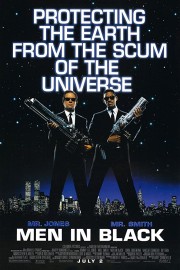Men in Black
Just watching the opening credits again, I was put in a mood of pure, cinematic bliss. Barry Sonnenfeld’s “Men in Black” is one of my all-time favorite summer comedies: the Rick Baker makeup effects; Danny Elfman’s funny and touching score (one of his best); Sonnenfeld’s brisk, confident pacing; and of course, the peerless chemistry between actors Will Smith and Tommy Lee Jones. No wonder this film was the highest-grossing of the summer of ’97 (and the year, before “Titanic” went on its record run).
However, as I watch the film again, I think more than ever that Vincent D’Onofrio as Edgar, the hillbilly farmer taken over by an alien cockroach, is the movie’s secret weapon to success. Like any good comic book movie, the film rises and falls with its villain, and D’Onofrio– aided by Baker’s superb makeup –creates one of the best bad guys in movie history. As is evidenced in standout performances in films ranging from “Full Metal Jacket,” “The Whole Wide World,” “JFK,” and “The Cell,” not to mention a fascinating character on “Law & Order: Criminal Intent,” D’Onofrio is one of the best actors of his generation, but here, he’s allowed to play fast and loose in a comedy, and he’s a natural. This is one of his best performances, and like every other great performance he’s given, on the list of roles unfairly neglected by the Oscars.
The story is pretty light. In addition to D’Onofrio’s villain trying to rule the galaxy (you know, like in most alien movies), the film’s primary focus is on James Edwards, Smith’s character, and his introduction into a super-secret government agency that tracks and monitors alien life both on (and off) the Earth. We first see Edwards as he’s chasing down a criminal in New York, and Smith defines the character perfectly on this chase. The cocky attitude. The athleticism. And the curiosity that will make him perfect for MIB when he’s first chosen for duty by Tommy Lee Jones’s Agent K. At first, it seems like the latest in a series of odd couple pairings, but as they’ll find out, that sort of dynamic will be essential to finding Edgar, and foiling his plans.
What “Men in Black” lacks in depth of purpose and story, it more than makes up for in style. Barry Sonnenfeld has never been like other comedy directors. A cinematographer for the Coen Brothers before he moved to the director’s chair, his best films (the “Addams Family” movies, “Get Shorty,” and the film in question) have been bright and more about visual and verbal comedy than telling a nuanced story. That’s what makes him such a great fit for this franchise; the movie doesn’t need to be a self-serious epic like “Independence Day” or “Transformers”– we’ve had too many of those types of movies over the years. This movie needs someone who understands a punchline, and all due respect to the Roland Emmerichs and Michael Bays of the world– they don’t. Unfortunately, Sonnenfeld hasn’t really succeeded in duplicating not just this success but any of his earlier success since the first “Men in Black”; true, he made a cult hit out of the live-action “Tick” TV show, but the less said about the likes of “RV,” “Men in Black II,” and– worst of all –“Wild Wild West,” the better (and what I’ve heard of the new “MIB” film doesn’t really bode confidence). All that being said, it’s tricky to make lightening strike twice, and honestly, I’m just grateful that it happened this once. Sonnenfeld, Smith, and Jones are a comedic dream team, bringing out the most in Ed Solomon’s screenplay, and all the production value executive producer Steven Spielberg can provide. This is a big slice of movie awesome, and you know what? I’ll take that any day of the week.










